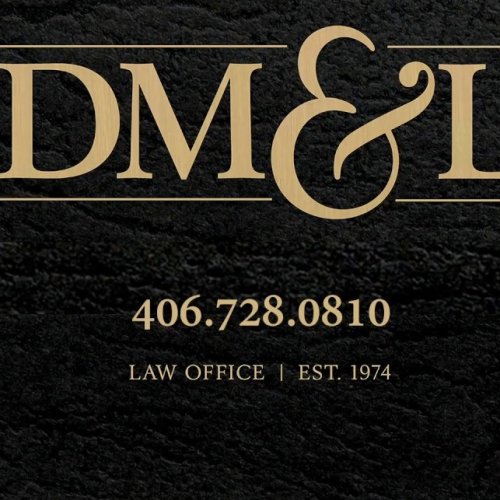Best Creditor Lawyers in Montana
Share your needs with us, get contacted by law firms.
Free. Takes 2 min.
Or refine your search by selecting a city:
List of the best lawyers in Montana, United States
About Creditor Law in Montana, United States
Creditor law in Montana refers to the body of legal rules and regulations that govern the rights and responsibilities of individuals and businesses who are owed money by others. This area of law covers a wide range of situations, from collecting debts and enforcing judgments to handling bankruptcy proceedings and resolving disputes over secured property. In Montana, state and federal laws work together to determine what steps a creditor can take to recover what they are owed, while also providing protections for debtors.
Why You May Need a Lawyer
People and businesses may need legal assistance with creditor issues in a variety of situations. These can include:
- Pursuing unpaid invoices or loans from customers, clients, or borrowers
- Garnishing wages or levying bank accounts to collect a judgment
- Ensuring compliance with the Fair Debt Collection Practices Act and Montana's own collection laws
- Resolving disputes over collateral in secured transactions, such as car loans or mortgages
- Responding to bankruptcy filings by debtors
- Enforcing or disputing liens against property
- Defending against claims of improper or aggressive collection efforts
- Negotiating repayment or settlement agreements
A lawyer can help creditors understand their rights, navigate complex legal procedures, avoid mistakes, and work to maximize their recovery while staying within the boundaries of the law.
Local Laws Overview
Montana has specific laws that impact creditors and their ability to collect debts. Some key aspects include:
- Debt Collection Practices: Montana creditors must comply with the federal Fair Debt Collection Practices Act, as well as Montana statutes that prohibit abusive or deceptive collection tactics. Violations can lead to penalties.
- Statutes of Limitations: There are time limits within which a creditor must file a lawsuit to collect certain debts. In Montana, written contracts typically have an eight-year statute of limitations, while oral contracts have a five-year limit.
- Judgment Enforcement: Creditors who win a lawsuit can seek to enforce a judgment through wage garnishment, bank levies, or property liens. There are rules about how much income or property can be collected.
- Exemptions: Montana law protects certain types and amounts of a debtor's property from collection, such as a portion of wages, necessary household goods, and a certain value in a vehicle or home.
- Secured Transactions: Creditors who lend money secured by collateral (like a car or home) must follow specific procedures for repossession or foreclosure if the debtor defaults.
- Bankruptcy: Federal bankruptcy law interacts with Montana's exemptions and procedures, impacting what creditors can collect and when they must stop collection activity.
Frequently Asked Questions
What is the difference between a secured and unsecured creditor?
A secured creditor has a legal claim to specific property (collateral) if a debt is not paid, such as a mortgage lender or car loan provider. An unsecured creditor does not have collateral backing the debt, such as a credit card issuer or medical provider.
How long do I have to collect a debt in Montana?
For most written contracts, creditors have eight years from the date of default to file a lawsuit. Oral contracts typically have a five-year statute of limitations. After these periods, collection through the courts is usually not possible.
Can I garnish someone’s wages in Montana?
Yes, if you have obtained a court judgment against the debtor. Montana law limits the amount that can be garnished, generally up to 25 percent of disposable earnings, subject to certain exemptions.
What actions are considered illegal for Montana debt collectors?
Debt collectors may not harass or abuse debtors, make false statements, threaten actions they cannot legally take, or contact debtors at unreasonable hours. Both federal and Montana laws regulate collection practices.
How do I place a lien on someone’s property in Montana?
Securing a lien generally requires a court judgment or, for certain types of debts like construction services, compliance with Montana’s specific lien laws. A lawyer can assist with the proper procedures.
What property is exempt from collection in Montana?
Montana law protects certain assets, including a portion of wages, personal items, necessary household goods, tools of the trade, a limited value in vehicles and equity in a home, and some retirement accounts.
What should I do if the debtor files bankruptcy?
Federal bankruptcy law imposes an automatic stay that halts most collection efforts. Creditors may need to file paperwork in bankruptcy court to pursue any exceptions or to assert their claim.
Can I charge interest or late fees as a creditor in Montana?
Generally, interest and late fees may be charged if agreed to in the contract, subject to limitations under Montana law for maximum allowable rates and disclosure requirements.
Do I have to accept a settlement offer from a debtor?
No, creditors are not required to accept settlement offers. However, negotiating a settlement may save time and legal costs and can sometimes result in quicker payment.
Should I hire a collection agency or a lawyer?
Collection agencies can help recover some debts, but lawyers are often needed for disputed debts, large amounts, legal actions, or when compliance with complex laws is required. Lawyers can represent you in court and provide tailored legal advice.
Additional Resources
If you are seeking additional information or assistance related to creditor matters in Montana, consider these resources:
- Montana Department of Administration - Oversees licensing of debt collectors in Montana.
- Montana Courts Self-Help Law Center - Provides forms and information on civil judgments and collections.
- Montana Legal Services Association - Offers guidance and sometimes representation for qualifying individuals with legal issues.
- United States Bankruptcy Court, District of Montana - Resource for bankruptcy filings and creditor participation in bankruptcy proceedings.
- Consumer Financial Protection Bureau - Information on debt collection practices and federal rights.
Next Steps
If you need legal assistance as a creditor in Montana:
- Gather all relevant documents regarding the debt, including contracts, communication records, invoices, and payment history.
- Consider whether your situation requires immediate action to protect your rights, such as responding to a bankruptcy notice or enforcing a judgment.
- Consult with a qualified attorney who has experience in creditor rights and collection in Montana. Many offer consultations to discuss your specific needs and recommend a course of action.
- Stay informed about your rights and obligations. Following proper procedures is essential to maximize your recovery and avoid legal pitfalls.
- Use local resources or court self-help services if you wish to pursue collection actions on your own but seek guidance.
Taking the right steps early can improve your chances of successful debt recovery and minimize potential legal complications.
Lawzana helps you find the best lawyers and law firms in Montana through a curated and pre-screened list of qualified legal professionals. Our platform offers rankings and detailed profiles of attorneys and law firms, allowing you to compare based on practice areas, including Creditor, experience, and client feedback.
Each profile includes a description of the firm's areas of practice, client reviews, team members and partners, year of establishment, spoken languages, office locations, contact information, social media presence, and any published articles or resources. Most firms on our platform speak English and are experienced in both local and international legal matters.
Get a quote from top-rated law firms in Montana, United States — quickly, securely, and without unnecessary hassle.
Disclaimer:
The information provided on this page is for general informational purposes only and does not constitute legal advice. While we strive to ensure the accuracy and relevance of the content, legal information may change over time, and interpretations of the law can vary. You should always consult with a qualified legal professional for advice specific to your situation.
We disclaim all liability for actions taken or not taken based on the content of this page. If you believe any information is incorrect or outdated, please contact us, and we will review and update it where appropriate.
Browse creditor law firms by city in Montana
Refine your search by selecting a city.










